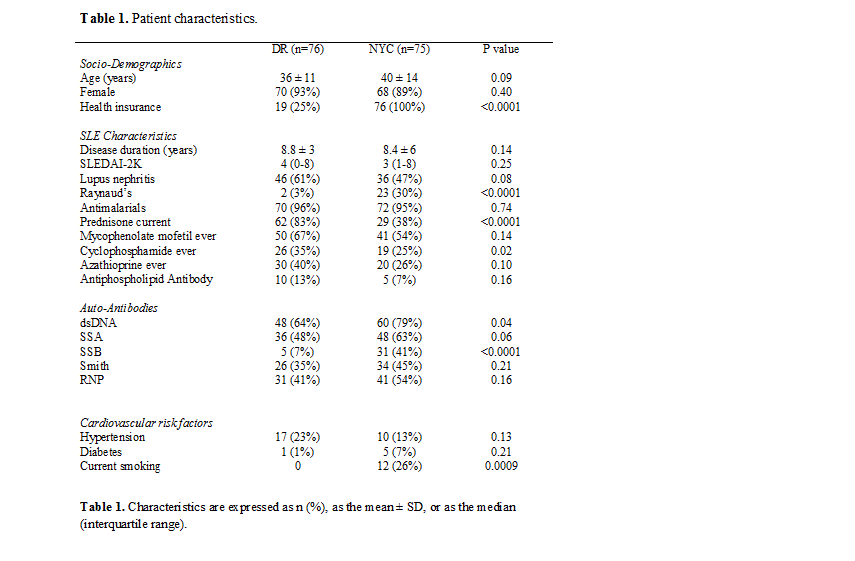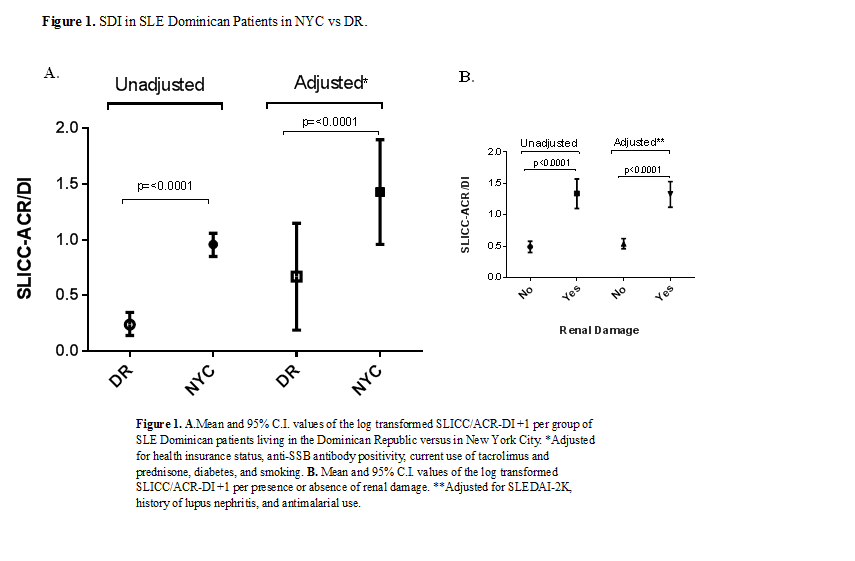Session Information
Date: Sunday, November 8, 2015
Title: Systemic Lupus Erythematosus - Clinical Aspects and Treatment Poster Session I
Session Type: ACR Poster Session A
Session Time: 9:00AM-11:00AM
Background/Purpose: Higher accrual of damage has
been reported in Hispanics with systemic lupus erythematosus (SLE) in the
United States. This study was initiated to evaluate the clinical
characteristics including the accumulated damage of Dominican patients with SLE
residing in New York City (NYC) compared to Dominicans with SLE living in the
Dominican Republic (DR).
Methods: One-hundred and fifty-one
Dominican SLE patients fulfilling ACR SLE criteria were cross-sectionally studied:
76 from NYC and 75 from the Dominican Republic. Socio-demographic and clinical
characteristics, disease activity (SLEDAI-2K), SLICC/ACR- damage index (SDI),
and comorbidities were compared between the two patient groups and linear
regression models were constructed to test the association with the SDI,
adjusting for pertinent covariates.
Results: The mean age was 40 (±14), and
36 (±11) years for the NYC and DR patients, respectively. Both groups had a median
disease duration of 8 years and mild disease activity based on their last
SLEDAI-2K. The NYC patients were more likely to have discoid lesions (20% vs.
3%), positive anti-ds-DNA (79% vs. 64%), and anti-SSB antibodies (41% vs. 7%).
Prevalence of hypertension, diabetes, antiphospholipid antibody syndrome, and
use of medications other than corticosteroids did not differ among the groups.
Those in the DR had more lupus nephritis (LN) (64% vs. 47%), were more likely
to be on corticosteroids (83% vs. 38%), and less likely to have medical
insurance (25% vs. 100%) (Table 1). However, a higher SDI was seen in NYC
patients (0.96 vs. 0.24, p=<0.0001), driven by a higher prevalence of damage
in the neuropsychiatric (16% vs. 3%, p=0.009)), renal (22% vs. 4%, p=0.0009),
pulmonary (22% vs. 1%, p=<0.0001), and musculoskeletal (32% v s. 16%,
p=0.02) domains. This association remained statistically significant after
adjusting for pertinent covariates (1.26 vs. 0.57, p=<0.0001) (Figure 1).
Conclusion: SLE Dominican patients residing
in NYC have a higher SDI than those in the DR. Longitudinal studies are needed
to ascertain whether this difference is due to biological, environmental
factors, or immigration patterns, or may reflect a survival bias.
To cite this abstract in AMA style:
Geraldino-Pardilla L, Canto I, Perez T, Then J, Loyo E, Askanase AD. Dominican Patients with Systemic Lupus Erythematosus Residing in New York City Have a Higher SLICC/ACR Damage Index Than Those in the Dominican Republic [abstract]. Arthritis Rheumatol. 2015; 67 (suppl 10). https://acrabstracts.org/abstract/dominican-patients-with-systemic-lupus-erythematosus-residing-in-new-york-city-have-a-higher-sliccacr-damage-index-than-those-in-the-dominican-republic/. Accessed .« Back to 2015 ACR/ARHP Annual Meeting
ACR Meeting Abstracts - https://acrabstracts.org/abstract/dominican-patients-with-systemic-lupus-erythematosus-residing-in-new-york-city-have-a-higher-sliccacr-damage-index-than-those-in-the-dominican-republic/


